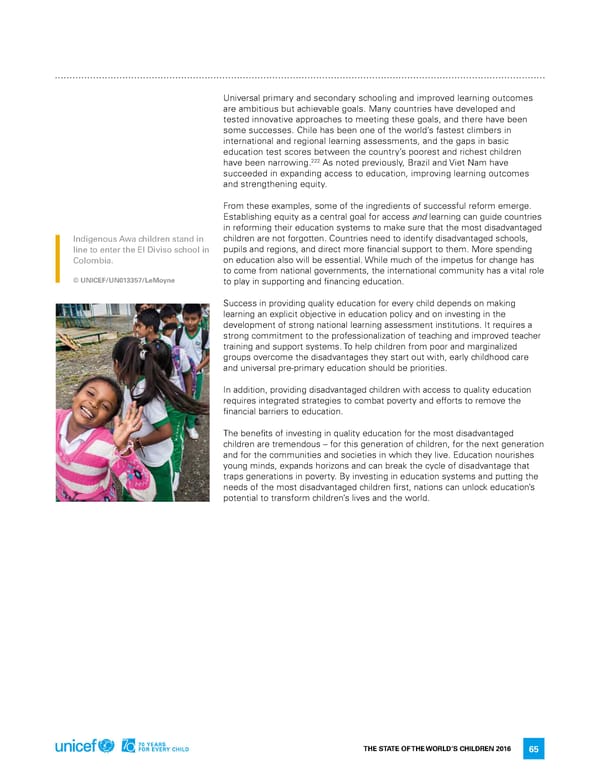Universal primary and secondary schooling and improved learning outcomes are ambitious but achievable goals. Many countries have developed and tested innovative approaches to meeting these goals, and there have been some successes. Chile has been one of the world’s fastest climbers in international and regional learning assessments, and the gaps in basic education test scores between the country’s poorest and richest children have been narrowing.222 as noted previously, Brazil and Viet nam have succeeded in expanding access to education, improving learning outcomes and strengthening equity. from these examples, some of the ingredients of successful reform emerge. establishing equity as a central goal for access and learning can guide countries in reforming their education systems to make sure that the most disadvantaged Indigenous Awa children stand in children are not forgotten. Countries need to identify disadvantaged schools, line to enter the El Diviso school in pupils and regions, and direct more financial support to them. More spending Colombia. on education also will be essential. While much of the impetus for change has to come from national governments, the international community has a vital role © UNICEF/UN013357/LeMoyne to play in supporting and financing education. Success in providing quality education for every child depends on making learning an explicit objective in education policy and on investing in the development of strong national learning assessment institutions. it requires a strong commitment to the professionalization of teaching and improved teacher training and support systems. To help children from poor and marginalized groups overcome the disadvantages they start out with, early childhood care and universal pre-primary education should be priorities. in addition, providing disadvantaged children with access to quality education requires integrated strategies to combat poverty and efforts to remove the financial barriers to education. The benefits of investing in quality education for the most disadvantaged children are tremendous – for this generation of children, for the next generation and for the communities and societies in which they live. education nourishes young minds, expands horizons and can break the cycle of disadvantage that traps generations in poverty. By investing in education systems and putting the needs of the most disadvantaged children first, nations can unlock education’s potential to transform children’s lives and the world. The STaTe of The World’S Children 2016 65
 70 Years for Every Child Page 80 Page 82
70 Years for Every Child Page 80 Page 82